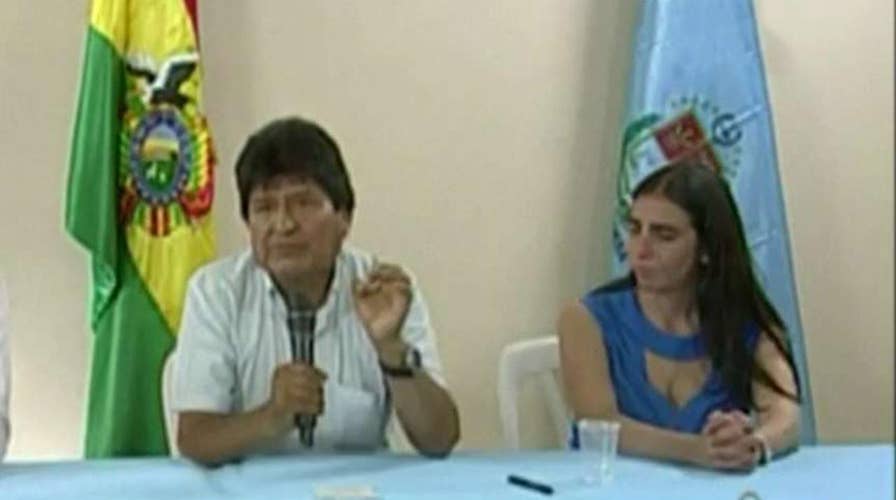Bolivian President Evo Morales to resign amid calls for new elections
The decision comes after continued protests for the president to step down.
His supporters call it an illegal coup. His opponents call it a victory for democracy. And everyday Bolivians are now mired in a political and constitutional crisis with no path forward.
Bolivian President Evo Morales resigned on November 10 amid widespread popular protests following an October 20 election, which many considered a sham and constitutionally dubious. The political crisis in Bolivia is truly unprecedented because the constitution does not outline who would take power after mass resignations in the government.
“President Morales, his vice president, and the leaders of the House and Senate all resigned. This created a vacuum of power, as the constitutional line of succession does not contemplate a case in which these four positions are vacant,” Michael Camilleri, director of the Rule of Law Program at the Inter-American Dialogue, told Fox News.
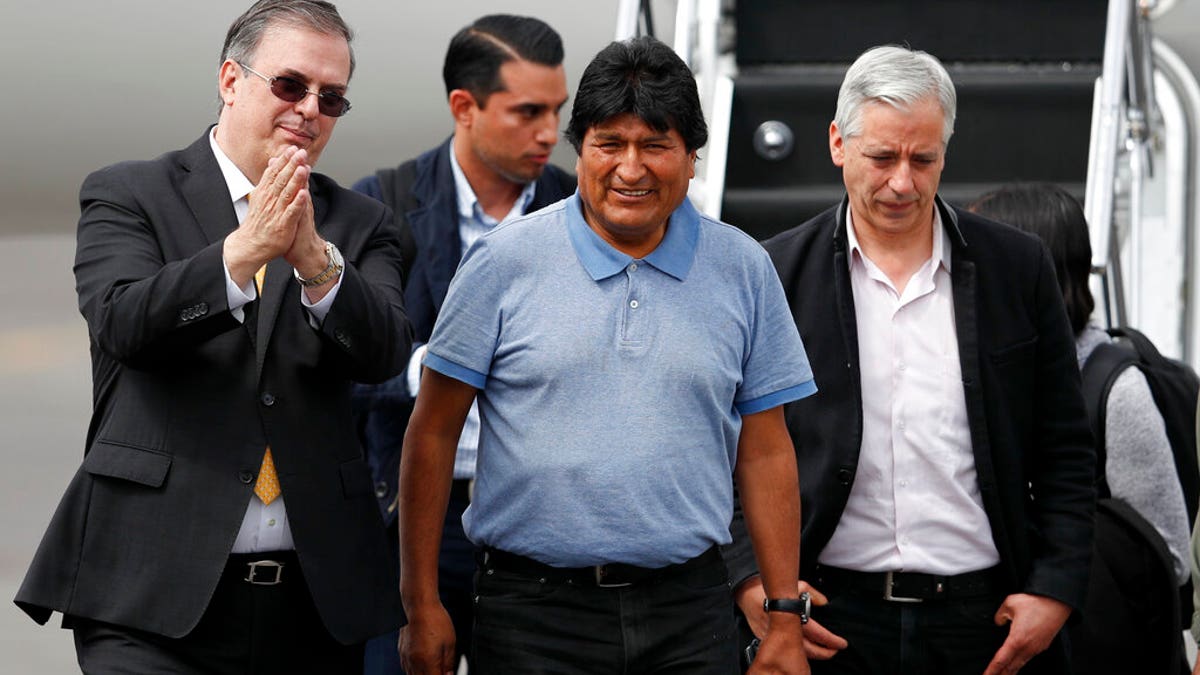
Mexican Foreign Minister Marcelo Ebrard, left, welcomes former Bolivian President Evo Morales and former Vice-President Alvaro Garcia Linera, right, upon their arrival in Mexico City, Tuesday, Nov. 12, 2019. Mexico granted asylum to Morales, who resigned on Nov. 10 under mounting pressure from the military and the public after his re-election victory triggered weeks of fraud allegations and deadly protests. (AP Photo/Eduardo Verdugo)
BOLIVIA'S SOCIALIST PRESIDENT EVO MORALES RESIGNS AMID ELECTION FRAUD ALLEGATIONS
Jeanine Añez assumed power as Bolivia’s interim president on November 13 and addressed the nation, promising to “reconstruct democracy” and bring the country together. The Constitutional Tribunal validated her ascent to power and fresh elections must be held within 90 days.
A lawyer and former television news anchor, Añez, the opposition leader in the Senate, is a religious conservative and carried a large Bible into the presidential palace where Morales had it removed.
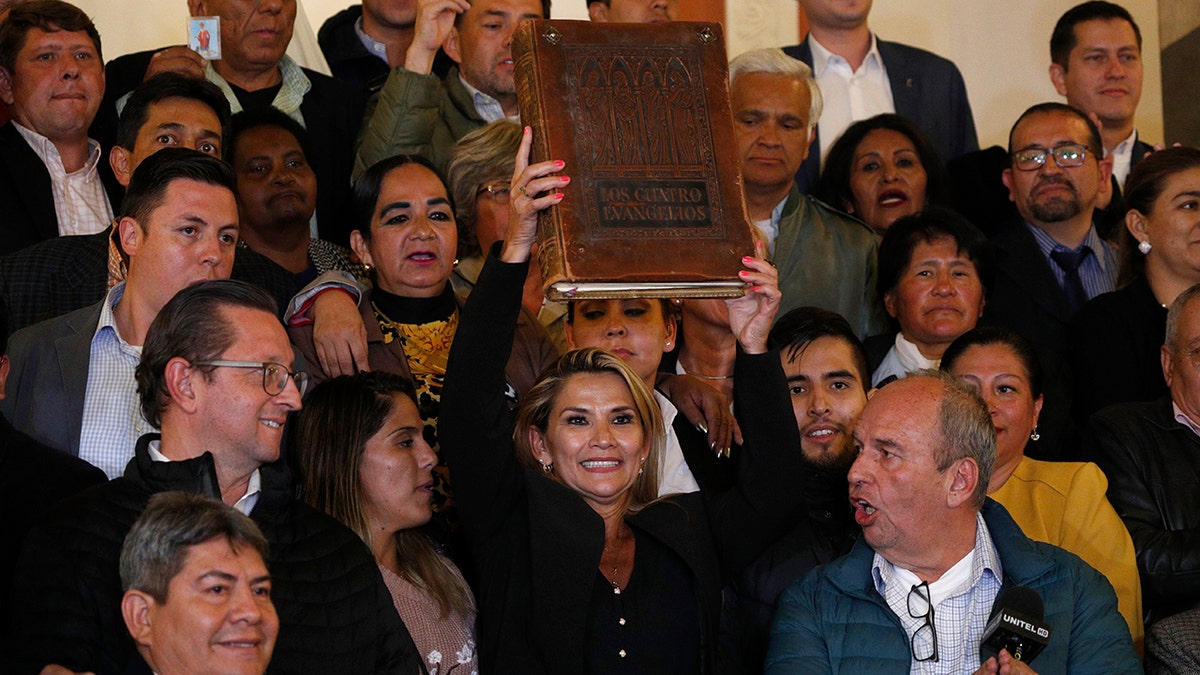
Surrounded by fellow lawmakers, the Senate's second vice president and opposition politician Jeanine Anez, center, holds a Bible after she declared herself the country's interim president during a session at Congress, in La Paz, Bolivia, Tuesday, Nov. 12, 2019. Anez took the step after protests and pressure from the army made former President Evo Morales quit his office. (AP Photo/Juan Karita)
“God has allowed the Bible to return to the palace,” she said
She also appointed a cabinet that doesn’t include anyone from Bolivia’s indigenous population, which comprises 41 percent of the population.
BOLIVIA EX-LEADER CLAIMS TO HAVE SPENT NIGHT AFTER RESIGNING LYING ON FLOOR UNDER BLANKET
According to a report in the Wall Street Journal, Añez was accused of posting racist and anti-indigenous tweets prior to becoming president. Añez has yet to gain the support of Morales’s Movement for Socialism Party or the indigenous community. The 52-year-old interim president is quickly consolidating power and ensuring forces loyal to Morales do not disrupt Bolivia’s fragile transition.
Meanwhile, Morales fled the country and was offered asylum in Mexico.
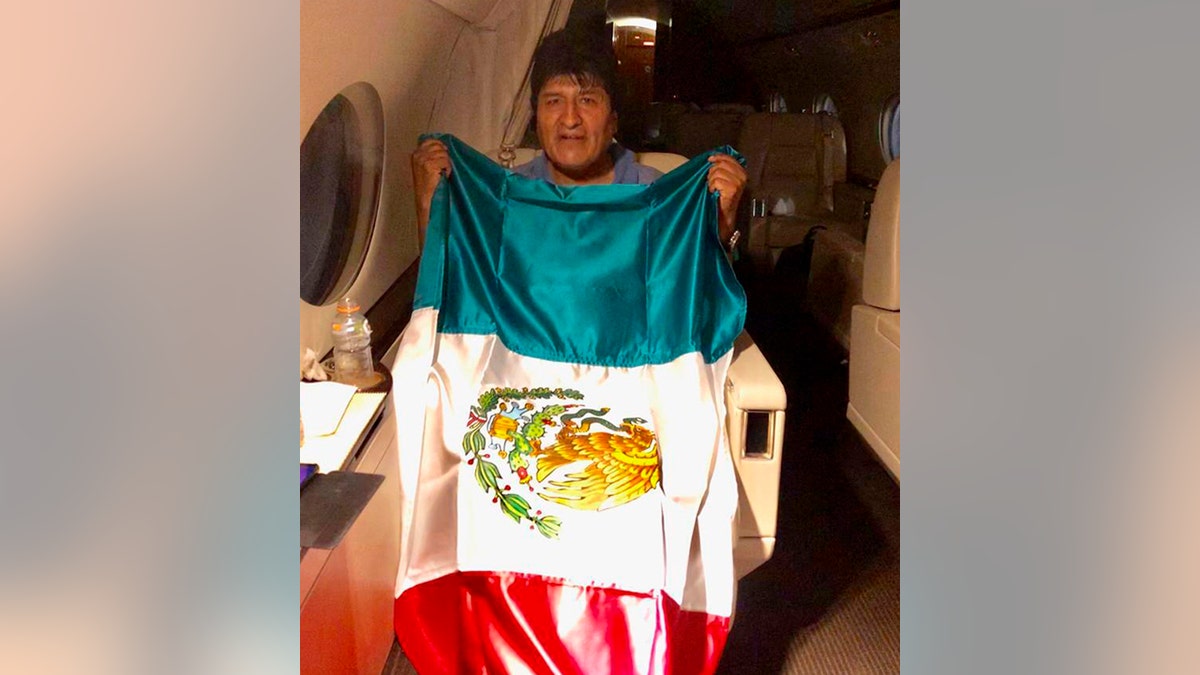
This photo released by by Mexico's Foreign Minister Marcelo Ebrard shows Bolivia's former President Evo Morales holding a Mexican flag aboard a Mexican Air Force aircraft, Monday, Nov. 11, 2019. Morales has been granted asylum in Mexico after he resigned to the presidency on Nov. 10, under mounting pressure from the military and the public after a disputed re-election victory that triggered weeks of fraud allegations and deadly protests. (Mexico's Foreign Minister via AP)
Even in exile, the former president called the move an illegal power grab and his supporters refuse to accept the placement of the interim president, taking to the streets to voice opposition to Añez. More importantly, Añez has the backing of the military elite to appoint a new cabinet.
The announcement of an interim president has not quelled the disaffected demonstrators and Bolivia remains extremely fragile and volatile. The polarized nation is still divided between those who cheered the ousting of Morales and those who remain ardent supporters in the Congress and society.
BOLIVIA INTERIM PRESIDENT DECLARES 'BIBLE HAS RETURNED TO THE PALACE' AMID GROWING UNCERTAINTY
Morales was actually a very popular president and implemented many economic policies that fostered growth and stability in a turbulent region. Riding the wave of high commodity prices, Morales was able to spend large amounts of revenue on social welfare programs causing a dramatic fall in the poverty rate. As commodity prices declined and debt steadily rose, the president lost some support with key constituencies.
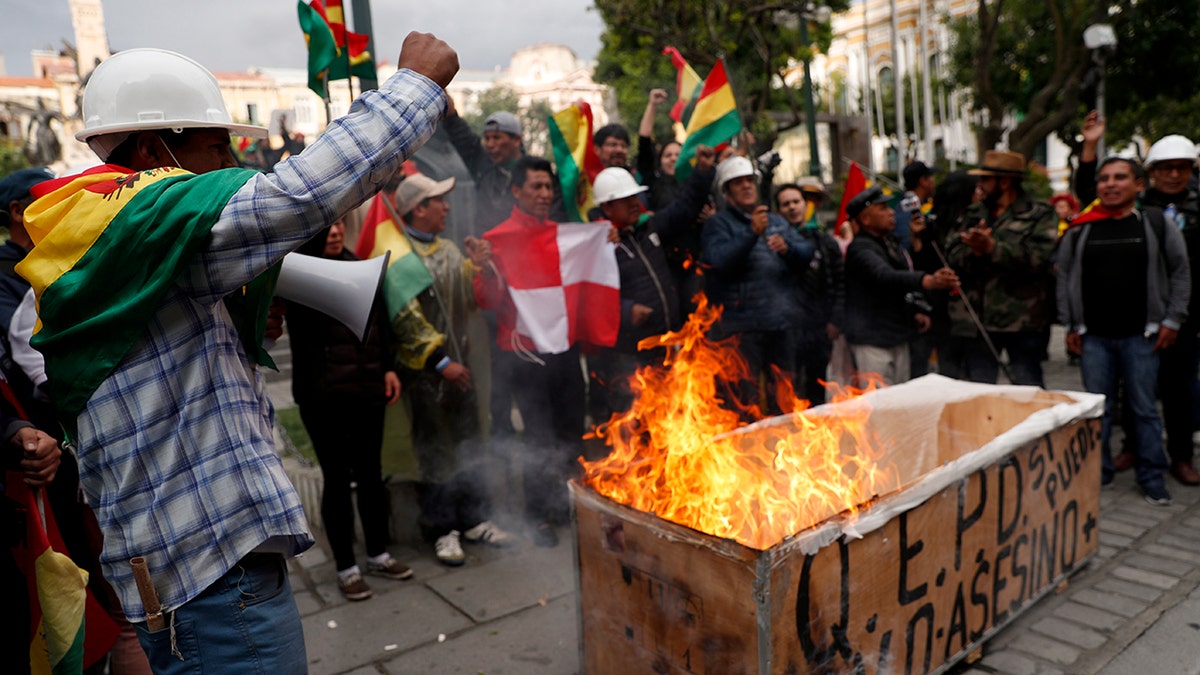
Opponents of Bolivia's President Evo Morales celebrate after he announced his resignation in La Paz, Bolivia, Sunday, Nov. 10, 2019. Morales resigned under mounting pressure from the military and the public after his re-election victory triggered weeks of fraud allegations and deadly protests.(AP Photo/Juan Karita)
Morales was seeking re-election for a fourth term in office in violation of the constitutionally mandated two-term limit. The Organization of American States (OAS), which monitors elections across the region, determined that there were “clear manipulations” within the electoral process and could not confirm that Morales had won. Morales ignored the OAS report and declared himself the winner.
As the legitimacy and integrity of the election were called into serious doubt, thousands of people took to the streets in opposition to Morales’ blatant power grab. Morales claimed he was able to stand for a fourth term because his first term from 2006 to 2009 predated the current constitution establishing the two-term limit.
Protests remained steadfast and firm in their demands, leading to Bolivia’s top military chief calling for Morales to step down. Morales initially agreed to fresh elections, but after three weeks of violent protests and as key members of the military defected, the pressure became too much.
BOLIVIA ERUPTS IN VIOLENCE AFTER EVO MORALES' NEAR OUTRIGHT ELECTION WIN, VOTE-COUNT DELAY
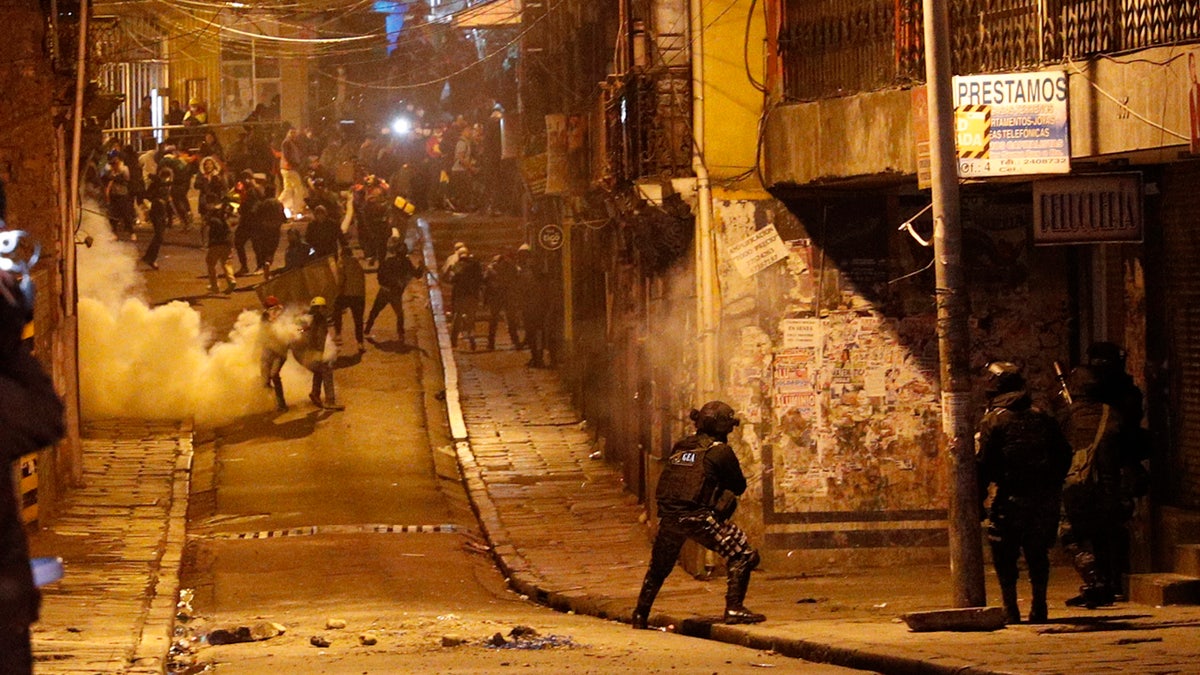
Police launch tear gas to disperse demonstrators during a protest against President Evo Morales' reelection, in La Paz, Bolivia, Tuesday, Nov. 5, 2019. (AP Photo/Juan Karita)
Morales, elected in 2006 and the first indigenous president of Bolivia, resigned to cheering anti-government demonstrators who had grown tired of his increasing authoritarianism and corruption.
Morales may have been ousted, but he is still not without key allies across the region.
Mexico’s leftist president, Andrés Manuel López Obrador, who offered Morales asylum, voiced support for the ousted Bolivian leader, as did the leftist president-elect of Argentina, Alberto Fernandez. The regions left-wing leaders were in lockstep with Morales, calling the overthrow of the president an illegal coup.
On the other hand, right-wing leaders, including Brazil’s Jair Bolsonaro, praised the uprising and the anti-government demonstrators. President Trump, a vocal opponent of the Latin America’s socialist leaders, called his resignation a “significant moment for democracy” in the Western Hemisphere.
“Morales’ removal from power has polarized the hemisphere along tired, ideological lines,” Camilleri said.
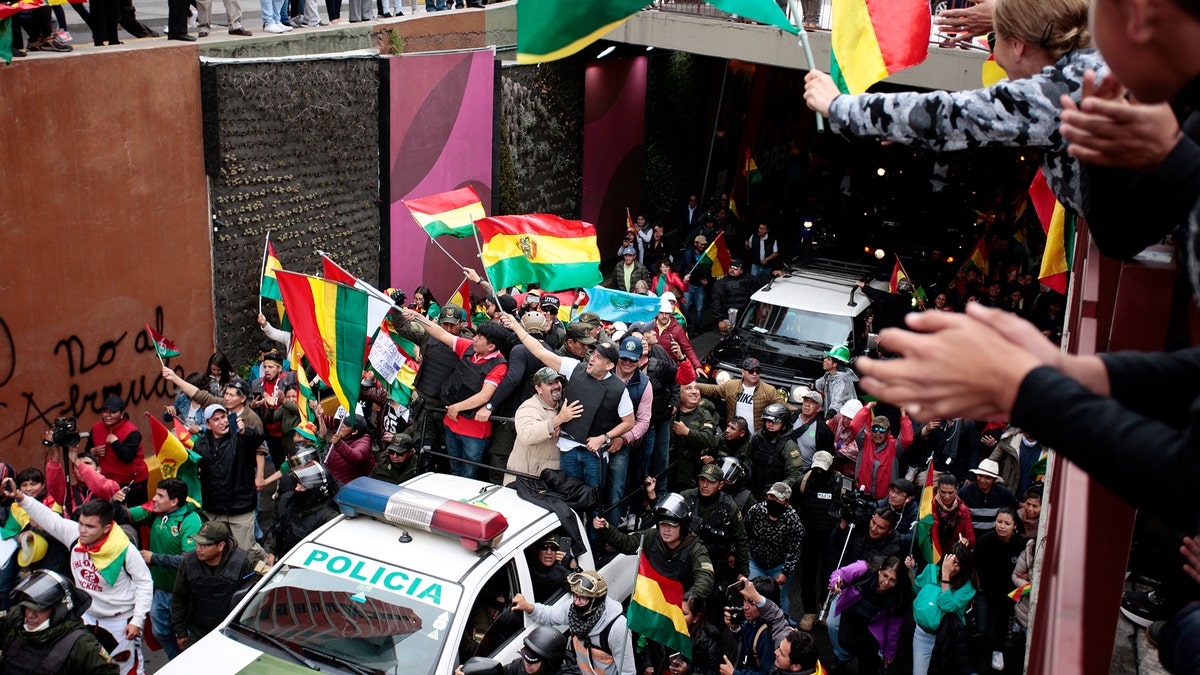
Luis Fernando Camacho, a Santa Cruz civic leader and major opposition figure, waves to the crowd while riding on a car, in La Paz, Bolivia November 10, 2019. REUTERS/Manuel Claure
“The United States and some governments in Latin America recognize Añez as the legitimate interim president, while other governments in the region argue that Morales was the victim of a coup. This is a negative development for cooperation among nations in the Americas, and underscores the importance of Bolivia holding credible, inclusive elections as soon as feasible, Camilleri added.
CLICK HERE TO GET THE FOX NEWS APP
Bolivia is also not the only country in the region facing widespread protests and civil unrest. Ecuador, Chile, and Peru are all facing disaffected protesters as their governments fail to address the economic grievances of the population following a collapse in the commodities boom.
These protests are against both right-wing and left-wing governments, highlighting the non-ideological nature of the social movements across the region.
